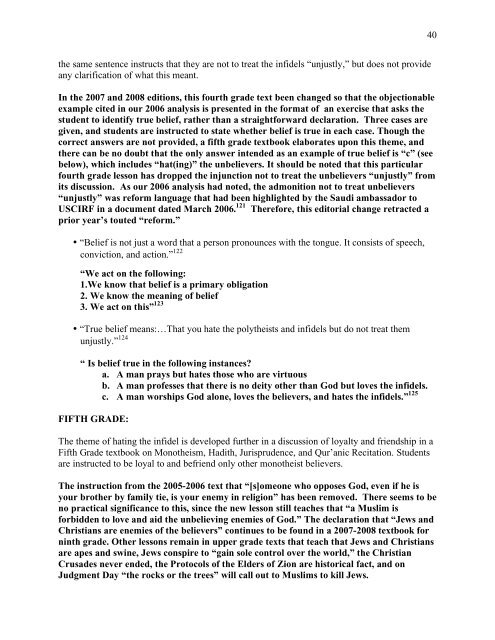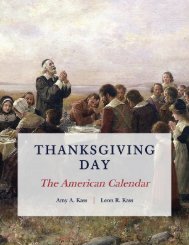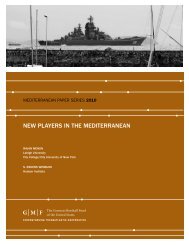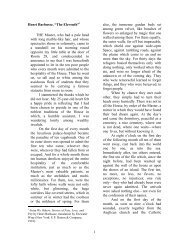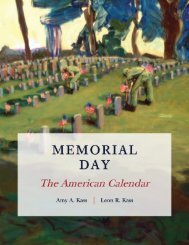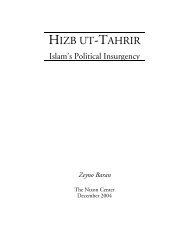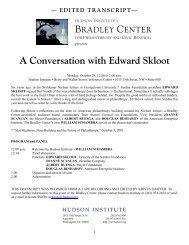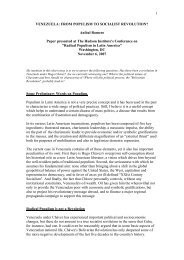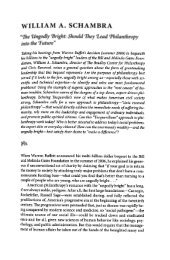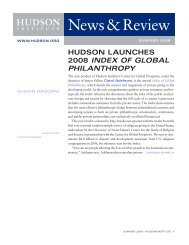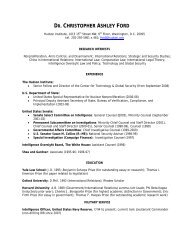Saudi Arabia's Curriculum of Intolerance - Hudson Institute
Saudi Arabia's Curriculum of Intolerance - Hudson Institute
Saudi Arabia's Curriculum of Intolerance - Hudson Institute
You also want an ePaper? Increase the reach of your titles
YUMPU automatically turns print PDFs into web optimized ePapers that Google loves.
40<br />
the same sentence instructs that they are not to treat the infidels “unjustly,” but does not provide<br />
any clarification <strong>of</strong> what this meant.<br />
In the 2007 and 2008 editions, this fourth grade text been changed so that the objectionable<br />
example cited in our 2006 analysis is presented in the format <strong>of</strong> an exercise that asks the<br />
student to identify true belief, rather than a straightforward declaration. Three cases are<br />
given, and students are instructed to state whether belief is true in each case. Though the<br />
correct answers are not provided, a fifth grade textbook elaborates upon this theme, and<br />
there can be no doubt that the only answer intended as an example <strong>of</strong> true belief is “c” (see<br />
below), which includes “hat(ing)” the unbelievers. It should be noted that this particular<br />
fourth grade lesson has dropped the injunction not to treat the unbelievers “unjustly” from<br />
its discussion. As our 2006 analysis had noted, the admonition not to treat unbelievers<br />
“unjustly” was reform language that had been highlighted by the <strong>Saudi</strong> ambassador to<br />
USCIRF in a document dated March 2006. 121 Therefore, this editorial change retracted a<br />
prior year’s touted “reform.”<br />
• “Belief is not just a word that a person pronounces with the tongue. It consists <strong>of</strong> speech,<br />
conviction, and action.” 122<br />
“We act on the following:<br />
1.We know that belief is a primary obligation<br />
2. We know the meaning <strong>of</strong> belief<br />
3. We act on this” 123<br />
• “True belief means:…That you hate the polytheists and infidels but do not treat them<br />
unjustly.” 124<br />
“ Is belief true in the following instances?<br />
a. A man prays but hates those who are virtuous<br />
b. A man pr<strong>of</strong>esses that there is no deity other than God but loves the infidels.<br />
c. A man worships God alone, loves the believers, and hates the infidels.” 125<br />
FIFTH GRADE:<br />
The theme <strong>of</strong> hating the infidel is developed further in a discussion <strong>of</strong> loyalty and friendship in a<br />
Fifth Grade textbook on Monotheism, Hadith, Jurisprudence, and Qur’anic Recitation. Students<br />
are instructed to be loyal to and befriend only other monotheist believers.<br />
The instruction from the 2005-2006 text that “[s]omeone who opposes God, even if he is<br />
your brother by family tie, is your enemy in religion” has been removed. There seems to be<br />
no practical significance to this, since the new lesson still teaches that “a Muslim is<br />
forbidden to love and aid the unbelieving enemies <strong>of</strong> God.” The declaration that “Jews and<br />
Christians are enemies <strong>of</strong> the believers” continues to be found in a 2007-2008 textbook for<br />
ninth grade. Other lessons remain in upper grade texts that teach that Jews and Christians<br />
are apes and swine, Jews conspire to “gain sole control over the world,” the Christian<br />
Crusades never ended, the Protocols <strong>of</strong> the Elders <strong>of</strong> Zion are historical fact, and on<br />
Judgment Day “the rocks or the trees” will call out to Muslims to kill Jews.


